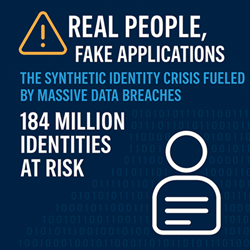Real People, Fake Applications: The Synthetic Identity Crisis Fueled by Massive Data Breaches

A Perfect Storm: 184 Million Records and a Rise in Synthetic Fraud
A new urgent warning from the FTC and Social Security Administration comes on the heels of a massive data breach that reportedly exposed 184 million personal identity records, including names, Social Security numbers, dates of birth, and addresses.
This treasure trove of compromised data is fueling a dramatic rise in synthetic identity fraud—a sophisticated scam where criminals combine real SSNs with fake names and addresses to create entirely new, fake applicants. These synthetic identities are now the fastest-growing type of financial crime in the U.S.
How the Fraudster Operates
Once they have access to PII, fraudsters can:
-
Use real SSNs (often belonging to children or the deceased)
-
Pair them with fabricated names and contact info
-
Build credit profiles over time to appear legitimate
-
Apply for car loans, credit cards, and even mortgages
-
Vanish, leaving behind unpaid balances and confusion
Red Flags That Were Missed
-
No check that the SSN and name actually match
-
Inability to verify ownership of mobile phone or email
-
Blind trust in online applications without identity verification
-
Weak or non-existent fraud filters at the prequalification stage
Who Pays the Price?
-
Consumers face long-term damage when their SSNs are used
-
Dealers lose inventory to fake buyers with fabricated credit histories
-
Lenders are stuck with uncollectible balances from ghosts that never existed
What Could Have Stopped It?
-
Verifying name, SSN, and phone number all belong to the same person
-
Requiring that the phone used to apply is owned by the applicant
-
Prequalifying credit only after identity is confirmed
-
Not letting synthetic identities into the CRM in the first place
Why Consumers Must Be Cautious Too
If you're shopping for a car, loan, or financing offer, don’t just click any “Get Prequalified” button. With 184 million identities now floating around on the dark web, your own information could be used without your knowledge. Worse yet, poorly designed prequalification tools can open you up to fraud or phishing.
Make sure the dealer or lender you're working with uses verified, fraud-resistant prequalification—like VeriQual.
How VeriQual Protects Everyone Involved
VeriQual is the first line of defense against synthetic and identity fraud in the credit prequalification process. Using just a phone number, VeriQual confirms that the identity is real and the mobile number is owned by the applicant before a soft-pull credit check is even run.
-
✅ Consumers are protected from having their identity misused
-
✅ Dealers stop wasting time and inventory on fraudsters
-
✅ Lenders prevent bad loans before they even start
Bottom line:
With 184 million identities exposed, it’s time for consumers, lenders, and dealers to be proactive.
Look for the VeriQual badge when getting prequalified for financing.
Share this article:

